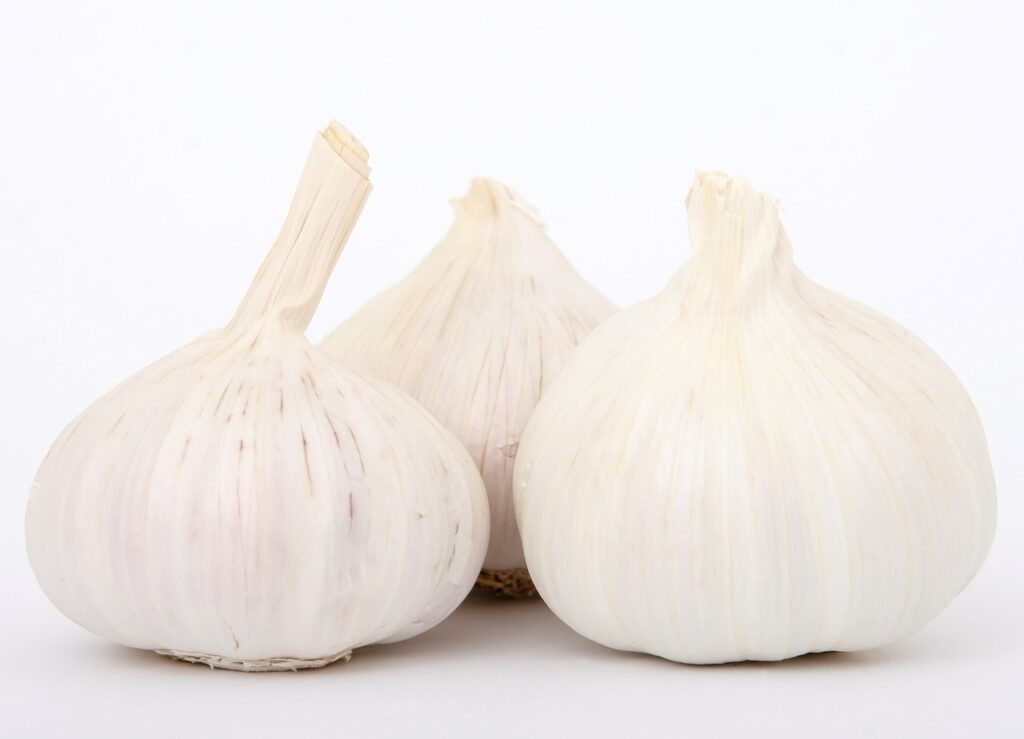What is Garlic Good For?

Garlic (Allium sativum) is a bulbous herb closely related to onions, shallots and leaks. It is one of the oldest known medicinal plants which has been used for at least 3,000 years in ancient Greece, Egypt, China and India. It has been credited with fighting heart disease, lowering blood pressure and helping to fight off colds.
There is vast scientific literature on the chemistry, pharmacology and clinical properties of garlic. Experimental studies have focused mainly on the cardiovascular and anticancer effects of garlic and its constituents, as well as its antimicrobial properties. Clinical studies have investigated mainly the anti-atherosclerotic and cholesterol and lipid lowering effects of garlic preparations.
The health benefits of garlic include:
1. Loaded with nutrients
Raw garlic is loaded with vitamins and minerals, including vitamin B6, manganese, selenium, vitamin C, iron, potassium, and copper. This powerhouse combination is especially good for cognitive function: Vitamin B6 and magnesium are both linked to boosting mood and improving brain health.
Garlic contains sulphur compounds, including allicin, ajoene, allyl sulphides, and vinyldithins, which are responsible for its beneficial health effects.
2. May boost the immune system
Garlic contains many sulphur-containing compounds, including allicin, ajoene, allyl sulfides, and vinyldithins, which are responsible for garlic’s antimicrobial actions.
Studies have shown that fresh garlic, garlic powder and garlic oil may boost the immune system and thus protect against bacterial, viral and parasitic infections. In fact it has been shown that garlic may reduce the severity of colds and can actually reduce the risk of catching a cold by approximately 30%. Studies have also shown that supplementing with garlic can reduce the duration of a cold by up to 70%.
3. May reduce Cholesterol Levels
Garlic can lower total and ΄bad΄ cholesterol (LDL) levels but it has no effect on raising the level of ΄good΄ cholesterol (HDL).
Garlic supplements can reduce total and/or LDL cholesterol by approximately 15-19% in people with high cholesterol.
High triglyceride levels are another known risk factor for heart disease, but garlic does not have any significant effects on this.
When allicin is heated during cooking, a substance called “ajoene” is formed. This substance has a suppressive effect on thrombi and blood cholesterol, and so may be effective in the treatment of atherosclerosis and thrombosis.
4. May reduce blood pressure
Cardiovascular diseases like heart attacks and strokes are the world’s biggest killers.
Uncontrolled hypertension, or high blood pressure, is a very dangerous condition as it increases the risk of heart attacks and strokes.
Human studies have shown that garlic supplements can help reduce high blood pressure. In fact, it was found that 600-1500 mg of aged garlic extract was as effective as the anti-hypertensive medicine atenolol at reducing blood pressure over a 24-week period. This is equivalent to approximately four cloves of garlic per day.
Garlic may also improve blood circulation as it stimulates the nerves and ensures that the heart works at a constant level, thus stabilising blood pressure. It also helps to dissolve cholesterol and fatty substances inside blood vessels thus refreshing cells and the blood inside the body.
5. May Protect against Dementia including Alzheimer’s Disease
Garlic contains high levels of antioxidants. These protect against oxidative damage caused by free radicals which is associated with the aging process.
It has been shown that high doses of garlic supplements can significantly reduce oxidative stress in people with high blood pressure. The combined effects of reducing cholesterol and blood pressure, as well as the antioxidant properties, may protect against cell damage and thus reduce the risk of common brain diseases, such as dementia.
6. May help protect against cancer
Garlic contains allyl sulfides, which are anti-inflammatory, cancer-fighting compounds which may slow down the growth rate of cancer cells.
Various studies have shown that garlic may help reduce the risk for several types of cancer, such as colon, stomach, lung, colorectal and breast cancer.
It has also been shown that the immune system boosting effect of garlic, together with its antioxidant effects, may help reduce the risk of tumour growth
7. May help remove Heavy Metals from the Body
At high doses the sulphur compounds in garlic have been shown to protect against organ damage from heavy metal toxicity.
In fact, studies have shown that garlic may help remove heavy metals, such as lead, mercury, cadmium and arsenic, from the body. One study found that garlic reduced the level of lead in the blood by 19% and that it also reduced many clinical signs of toxicity, including headaches and blood pressure. This suggests that garlic may be used to help chelate or remove dangerous lead concentrations from the body.
8. May have an anti-inflammatory effect
Garlic contains allyl sulfides, an anti-inflammatory, cancer-fighting compound. Studies have shown that these allyl sulfides slow down the growth rate of cancer cells. In addition, garlic contains many sulphur containing compounds which have anti-inflammatory and antioxidant properties which protect the body from free radicals
This makes it ideal for cardiovascular support, especially against chronic degenerative cardiovascular conditions such as atherosclerosis. In fact, garlic is best as a cardio-protector when it is raw and freshly crushed, as opposed to heat-treated or otherwise processed garlic.
9. May help protect the liver
Garlic rejuvenates a tired liver and promotes its normal functioning. It activates the cells of the liver and thereby protects the liver from toxic substances as it helps the body flush out toxins more efficiently, which in turn benefits the entire body overall.
10. Regulation of blood sugar level
Allicin combines with vitamin B1 (thiamine) to stimulate insulin secretion from the pancreas. As a result, garlic may be effective in the prevention and/or treatment of diabetes which is caused by a lack of insulin or by impaired pancreatic function.
Possible Side Effects
People who are sensitive to garlic may experience flatulence or heartburn.
Possible Interactions
Garlic can interact with certain medications and so garlic supplements should only be taken after first consulting a doctor when taking the following medicines:
- Blood thinning medicines: Garlic may increase the activity of blood thinning drugs, such as warfarin,
- Blood sugar lowering medicines: Garlic supplements may increase the activity of medicines used to lower blood sugar levels in the treatment of Type II diabetes.
Summary
Garlic can easily be added to food to drastically improve its flavour. It has several health benefits, especially when it’s raw and freshly crushed. It is available in various supplements which are usually odourless.
When taken regularly the health benefits of garlic include the reduction of total cholesterol and LDL levels, improved immune system function to fight infections and tumours, reduction of blood pressure and improved circulation, and reduced risk of blood clots which are responsible for most heart attacks and strokes.
